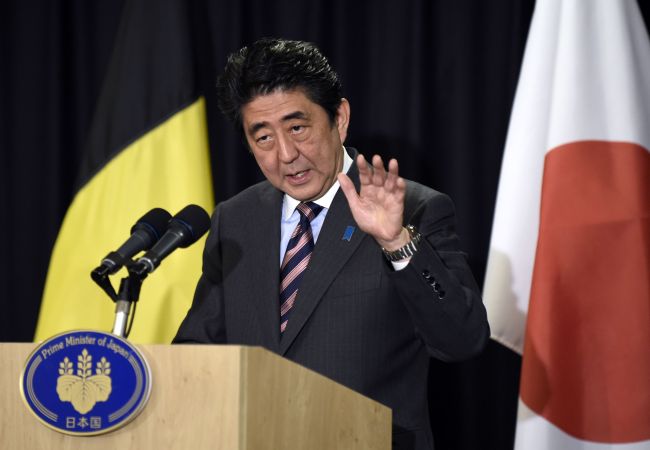Tokyo’s push for collective self-defense is picking up pace as it is poised to announce its stance toward the reinterpretation of its war-renouncing constitution this week to attain its long-cherished security goal.
The announcement is expected to further unnerve South Korea and China, the major victims of Japan’s past militarism, as the pursuit of collective self-defense ― the use of force to support allies under attack ― comes without Tokyo fully recognizing its wartime atrocities.
Japanese Prime Minister Shinzo Abe is expected to clarify Tokyo’s position on the limited exercise of the right to collective self-defense after his security advisory panel submits to him a report in support of the right later this week.

Japanese Prime Minister Shinzo Abe
Kyodo News reported that Tokyo was considering exercising the right only when contingencies in surrounding areas, including the Korean Peninsula, pose a “direct” threat to Japan’s security.
Apparently to elicit the support of the New Komeito Party, the ruling Liberal Democratic Party’s coalition partner, Abe’s panel has reportedly created a series of preconditions, or scenarios, under which collective self-defense can be applied. The junior party has remained opposed to undermining Japan’s pacifist constitution.
The scenarios are reported to include a nearby country under attack; a contingency in surrounding areas posing a grave security threat to Japan; an attack on a country calling for Japan’s support; and securing parliamentary approval for the exercise of collective self-defense.
The Tokyo government is also to publish a book in which it will list various cases for collective self-defense. Based on the cases, the LDP and its coalition partner will consult over whether to allow for collective self-defense.
Abe seeks to finalize Tokyo’s stance over collective self-defense through a Cabinet decision, before the extraordinary parliamentary session begins this fall.
As to Japan’s move to bolster its security role, South Korea has mixed feelings. Japan’s enhanced security role would help deter North Korea’s provocations, but its stronger armament revives bitter memories of Japan’s brutal colonization of the peninsula from 1910-45.
Japan has imposed its stricture on the use of its Self-Defense Forces for collective self-defense based on the pacifist constitution, which helped the onetime aggressor build trust with the international community and pursue a mercantilist postwar development policy.
But amid U.S. pressure on Japan to increase its security contributions in the region and beyond, and an escalating territorial dispute with China, Tokyo has sought to alter the interpretation of the constitution to allow for collective self-defense and become a “normal” state with a full-fledged military.
For the U.S., Japan’s military buildup is a positive development that would help Washington’s so-called rebalancing policy toward the strategically vital Asia-Pacific.
Uneasy with Japan’s inability to help its military in the case of a contingency, the U.S. has long encouraged Tokyo to play a greater security role in the region rather than just making monetary contributions.
Particularly with China becoming more assertive in maritime disputes, Washington has welcomed Japan’s heavier armament and sought to strengthen the three-way security cooperation with Japan and South Korea.
By Song Sang-ho (sshluck@heraldcorp.com)






